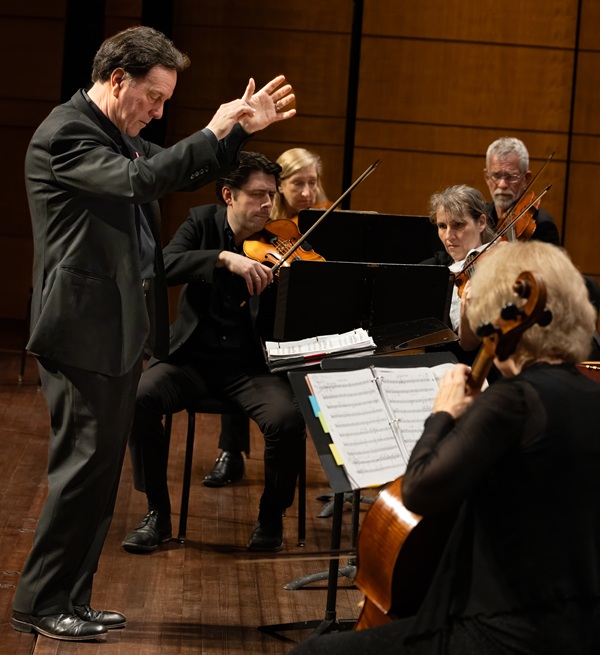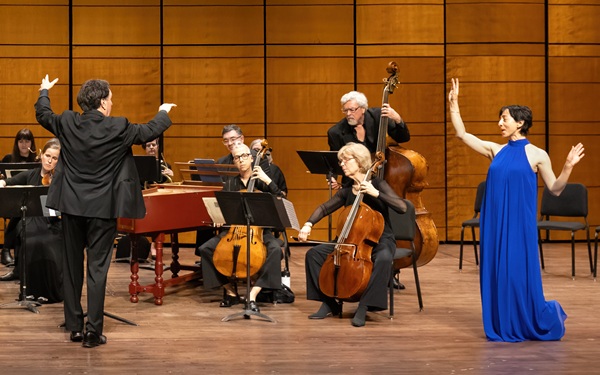Opera Lafayette says heartfelt musical adieu to founder Ryan Brown

Ryan Brown conducted the Opera Lafayette orchestra Thursday night in the Kennedy Center Terrace Theater. Photo: Jennifer Packard
Opera Lafayette honored its founder and artistic director, Ryan Brown, with a retrospective concert Thursday night, before he steps down at the end of this season. Heard in the Kennedy Center Terrace Theater, the program surveyed a number of touchstones from Brown’s 30-year tenure, emphasizing rarely heard music of the 18th century. The live presentations and recordings led by Brown under the Opera Lafayette banner remain among the few, if not the only, examples of modern engagement with these works.
Pierre-Alexandre Monsigny’s Le Déserteur, from 1769, was a hugely successful opéra-comique of the late 18th century, traveling to America and still performed in France up to the beginning of the 20th century. The aria presented on the concert, “Ah! Je respire” from Act I, covers a wide gamut of emotions, well shaped by Brown and the Opera Lafayette orchestra. Baritone John Taylor Ward brought a noble sound to the character of Alexis, though his energy seemed to flag a bit and his sound tended to lose color in more intricate passages.
A Gluck set began with his 1777 treatment of Armide, soprano Paulina Francisco bringing graceful lines and unexpected reserves of power to Armide’s aria “Ah! Si la liberté me doit être ravie,” followed by the charming chorus “Ah! Quelle erreur.” Highlights from Gluck’s best-known work, Orphée et Eurydice, included the “Ballet of the Blessed Spirits,” with Brown drawing sensitive articulation from the orchestra and fine flute and oboe contributions from Charles Brink and Margaret Owens. James Reese brought a focused, attractive tenor to two of Orphée’s numbers: “Quel nouveau ciel” and “O vous ombres que j’implore.” Intimate readings of several of the opera’s choruses rounded out the set (tenor Gene Stenger joined the soloists in several ensembles).
Opera Lafayette has often pursued the challenging work of reanimating the comedies of the distant past, and delved into that tradition to close the first half, beginning with an appealing reading of the overture to André Grétry’s Le magnifique, from 1773. Soprano Pascale Beaudin, a frequent Opera Lafayette collaborator, also presented a sly aria from Gretry’s L’épreuve villageoise, from 1784, supported by finely characterized comic touches in the strings, while tenor Reese thoroughly realized the showpiece “Quittez nymphes” from Rameau’s Platée, from 1754.

Conductor Ryan Brown and soprano Pascale Beaudin performed with Opera Lafayette orchestra. Photo: Jennifer Packard Photography
François-André Danican Philidor’s Sancho Pança dans son isle, from 1762, parlays Cervantes into a satire of contemporary French society and government. John Taylor Ward was effective in Sancho’s humorous aria about being treated as a child’s toy ball, while Brown led a muscular reading of the work’s finale, “Je vais revoir ma chere metairie,” including the full cast.
Following video excerpts of Opera Lafayette’s past productions, artistic director-designate Patrick Quigley led the orchestra and Paulina Francisco in Mozart’s great solo motet for soprano, Exultate Jubilate. Francisco delivered a reserved yet elegant sound, with particular purity in her upper-register flourishes. Quigley presided over a flowing reading with the strings assuming a fuller, more burnished sound.
Yet after that dose of aggressively liturgical Mozart, the return to French theater music, with the beguiling final trio from Sacchini’s Oedipe à Colone, from 1784, was like stepping into a warm bath. Led by Brown again, he made an effective final case for how lively and committed music-making can unearth the pleasures in these forgotten works.
Opera Lafayette will announce its 2025-2026 season soon. operalafayette.org
